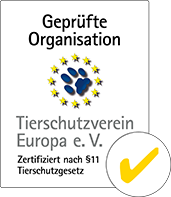Mediterranean diseases are the common name for a group of diseases that occur and are transmitted mainly in the Mediterranean region. They are also rightly called travel diseases, because a dog can also become infected while on holiday in these countries. Transmission occurs via sand flies or ticks, which are mainly found in warmer climates.
Mediterranean or travel diseases include leishmaniasis, dirofilariosis (heartworm), ehrlichiosis and babesiosis.
How are the diseases detected?
We test all dogs over ten months old before they leave for Germany. You will receive the report together with the handover of your dog and the vaccination card.
This routine test is not based on direct pathogen detection, but on the detection of antibodies (ELISA, IFA). As these antibodies remain detectable even if the pathogen has already been eliminated, a positive antibody titre does not necessarily mean an infection. Antibodies are also present after contact with the pathogen has been overcome. Direct pathogen detection (antigen test / PCR) can provide information to determine whether the infection has been overcome or is still active. But even here the diagnosis can be difficult. For example, a heartworm takes about 6 months to develop from the microfilariae, which are transmitted by a mosquito bite, to the "adult worm", which colonises the heart. Only the adult worm can be detected by PCR.
Unfortunately, even the absence of antibodies does not rule out an infection, as the body needs time to produce these antibodies. There is often only 2 weeks between the first exposure to the pathogen and the first possible antibody detection, but in individual cases it can take years before detection and/or an outbreak of the disease occurs. It is also possible for a dog to become infected shortly before travelling abroad and thus test falsely negative.
Puppies can be infected via the uterus even before birth. They can receive certain pathogens and/or only the mother's antibodies in this way. A positive antibody test in young dogs can therefore either mean that the dog is actually infected and will fall ill, or that it is completely healthy and only has antibodies from its mother, which are usually broken down by the age of 9 to 10 months.
No test is one hundred per cent! For this reason, all dogs coming to Germany from the Mediterranean region should be tested for travellers' diseases again after 6 months. The following applies to all diseases: the earlier treatment is started, the better the prognosis for the dog.
Further information on the diseases
Mediterranean or travel diseases include leishmaniasis, dirofilariosis (heartworm), ehrlichiosis and babesiosis.
YOUR HELP FOR ANIMAL WELFARE
Other ways to donate







